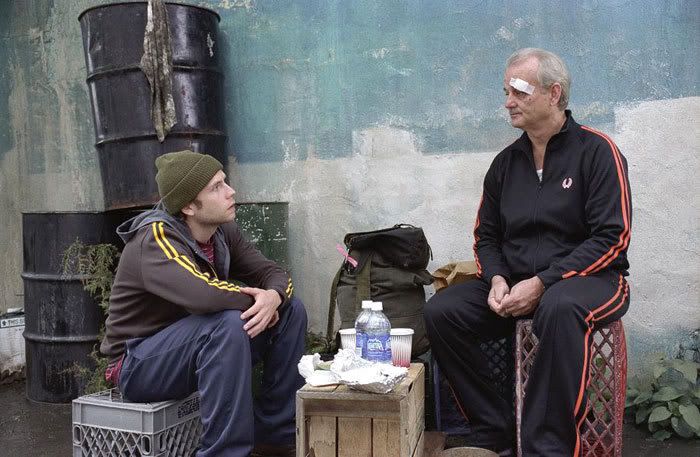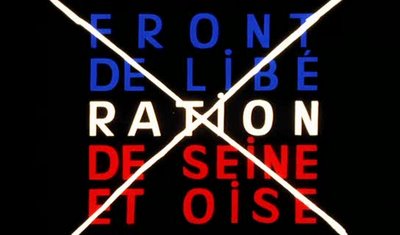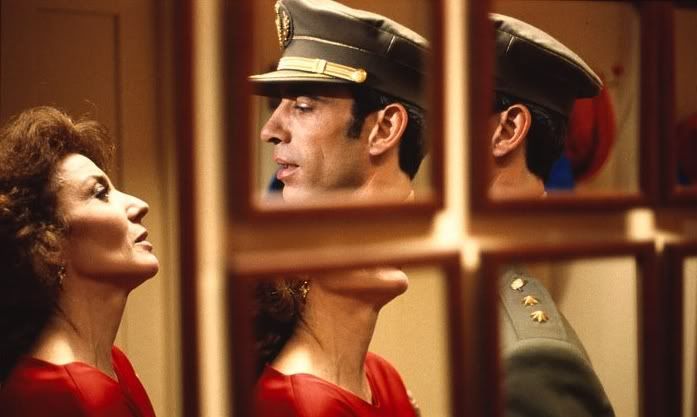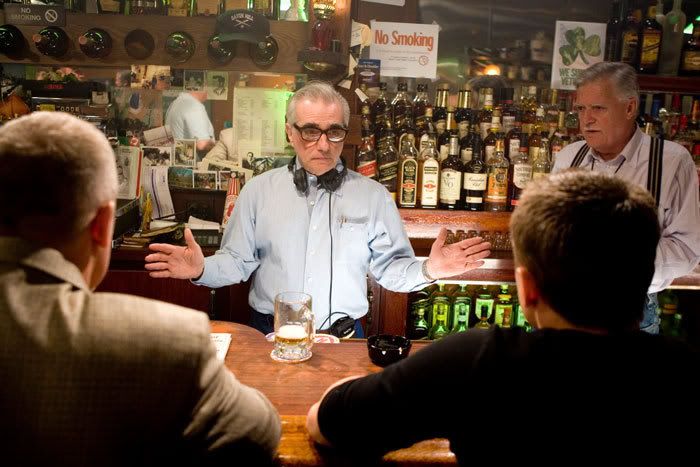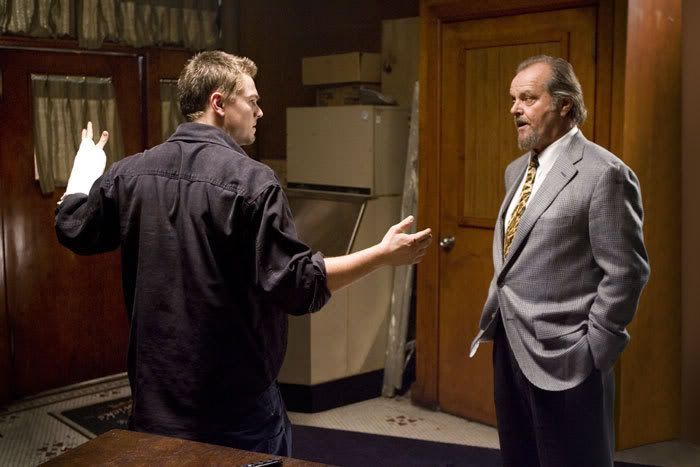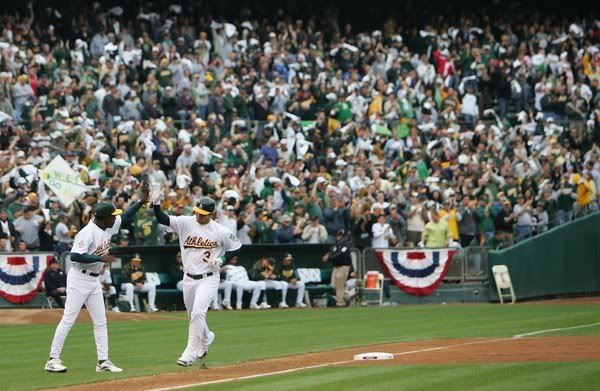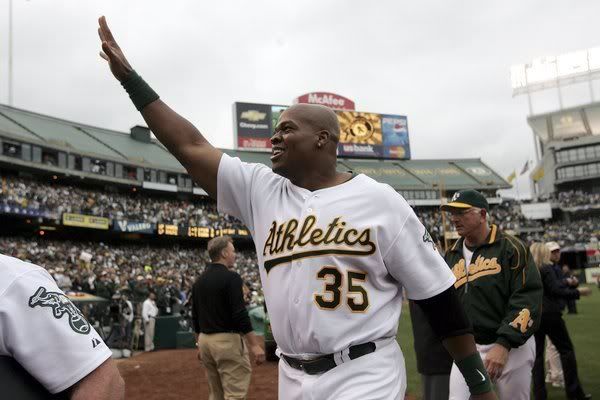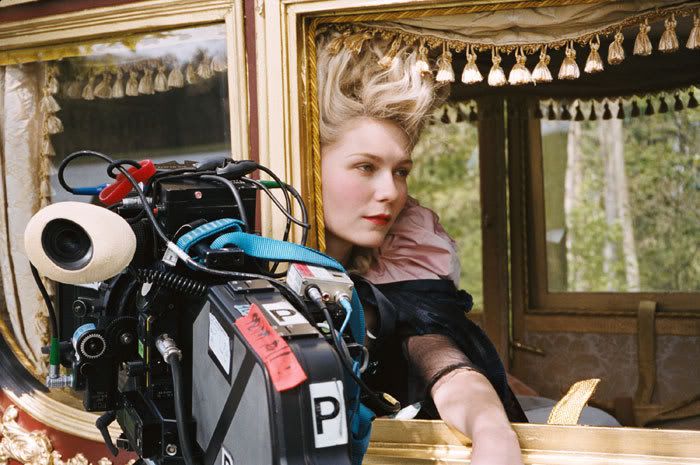
by
Ryland Walker KnightIt certainly seems
easy, and
chic, to dismiss Sofia Coppola's career as a film director, amping up her apparent "poor little rich girl" persona as a critical debunker. But envy is not an analytic argument. Envy is a facile batting of the eyes, as supercilious as all the shoes and cakes and gowns and champagne a young princess could ever hope to cloud her life with. Of course,
Sofia's life is enviable to legions of hip, would-be jetsetting shoppers with funny money to burn. But that's not what the film hopes to inspire in its audience, even if it meets those ends.
MARIE ANTOINETTE plays not as polemic history lesson, as many would hope (the politics are sublimated, mostly kept off screen), but as a near naked autobiographical justification for downright girliness and Coppola's latest defense for the vitues of adolescent vaccum ennui.
The best lesson Ms Coppola has gleaned from her famous filmmaker daddy was "get the best editor you can--they'll save you every time." And often a good editor helps add to the allure of an auteur, garnering somewhat undeserved acclaim for the director. Many directors live and die by their editors (Scorsese) and it's no different for the Coppola clan. For the patriarch, on his best films (those four from the 01970s), this was the unparalled
Walter Murch, who also lent a master touch to each film's sound design. For his daughter, this helping hand is the undeniably talented
Sarah Flack, whose skills have helped elevate a number of films, including Sofia's previous film,
LOST IN TRANSLATION. The elliptical nature of both films is a clear sign of this editor's influence. In Coppola's first film,
THE VIRGIN SUICIDES, the narrative was weightless, unbouyed, willing to drift from memory to memory; it played like a series of idea fragments caught surreptitiously and organized like jigsaw. LOST IN TRANSLATION sought an ennui cloud nine by way of Antonioni and the results were highly successful until the last minutes when the core relationship was no longer about isolation but a vague romantic possibility Scarlett Johansson's lonely naif Charlotte dreams up (and acts out?) with Bill Murray's washed up movie star Bob. All the ellipses within the film hit the right notes, matched by its perfect soundtrack, to carry you in the film's rhythm but the ending fails. The Jesus & Mary Chain's plastic rock can almost save it, but not quite: a final shot of Bob's limo winding along Tokyo's freeways is impressive, and evocative of the previous theme, but that whispering on the crowded street was a cop out. Unfortunately, the trend continues in MARIE ANTOINETTE. After an hour and a half of staggering beauty the film falls in on itself with forty-five minutes left. Its final handling of the titular royal's demise is another hollow cop out one cannot forget (or forgive) despite an indelible, inspired parting shot.
The film's opening may be its best moment, validating any worries (or giddy excitements) one might have concerning the New Wave & Post-punk soundtrack: Over Sex Pistols title cards, Gang of Four clang into gear singing, "The problem of leisure/What to do for pleasure" before we get our first image of Marie reclining for a pedicure, eating cake and taking a moment to smile at the camera. Film logic tells us this scene comes from Marie's present, an Austrian castle, but the costuming (including her hairdo) and setting tells the reflective viewer this is from the Marie's near future as queen of France. The chair Marie lays in echos the bathtub we will see her take solace in later, as do the cakes and pedicure prefigure the stylistic shopping orgy played out to Bow Wow Wow's never-subtle "I Want Candy" anthem. And the look she gives the audience is just the first glance at empathy: there are so many closeups of Kirsten Dunst emploring the camera to love her that I lost count.
Much like the diorama worlds Wes Anderson dreams up to stuff his wide-angled frames, Ms Coppola's films offer a hermetic landscape, exemplified to its utmost with her version of Versailles. Populated opulence, the French court remains oblivious to the last, happiest partying, shopping, indulging; the decadent solipsism never flags. We're trapped there, too, surrounded by Coppola's reverence for the look of the period, if not its history. The film is carried along not by any plot but sheer visual splendor, eager to celebrate the big budget costumes and real palace sets cinematographer Lance Accord so deftly captures, placing our princess in a gilded cage, color coded to her mood.
Dunst plays Marie as naive, reading her lines flat as if reciting from a mental list of the right & wrong situational sayings. She comes to life when unscripted, partying or playing with her daughter, further fostering the rigidity of the court. It comes as no surprise that the only members with any palpable vitality are King Louis XV (Rip Torn can growl all he wants all the way to comic pantheon) and his sultry, black sheep mistress Du Barry (Asia Argento was born to play hookers, I think). Which isn't to say the rest of the court is poorly acted, in fact plenty are good performances. The most surprising is Jason Schwartzman as the effete dullard of a punchline, Louis XVI, who would rather hunt and eat than plow his hot little new wife like everybody else wants to. But the best acting (aside from Argento) is done in two minor, non-court roles by two enormously talented actors inconcievably underused: Steve Coogan as Ambassador Mercy and Danny Huston as Marie's brother Emporer Joseph of Austria. Coogan pops up on cue throughout the film as Marie's sage shoulder to lean on but Huston is onscreen for maybe five minutes and blows away the entire cast. While not as august and imposing as his father, Huston uses his size to fullest effect: he never appears a bully but you can see the cower in Schwartzman as they walk side by side. But then, as soon as he swoops in to delight, he's gone.
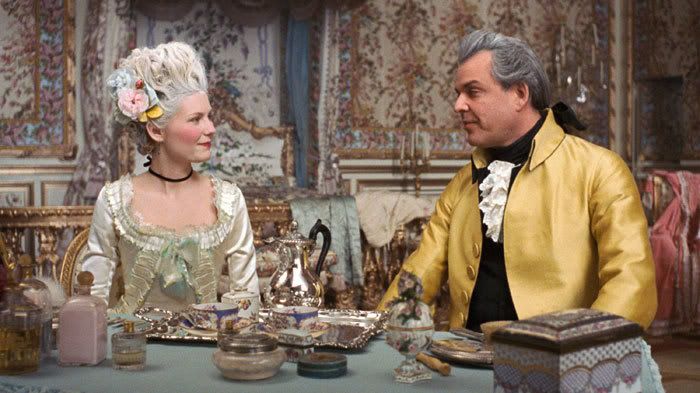
There's another sustained twenty minutes or so before Marie withdraws to her personal haven at Petit Trianon with her daughter in tow to tend an odd flock of assorted farm animals--and fuck a pretty boy Swede--but once that sets in, its earnest naivete wears thin. The soundtrack starts drawing attention to itself when The Strokes yell "I want to be forgotten, and I don't want to be reminded--so please don't make this harder..." and the clumsy portrayal of Marie as fierce wife instead of foolhearty mother near the close doesn't help Coppola's cause. By the time Marie bows to the obfuscated, angry mob outside her veranda--and silences them!--we've practically checked out, all the pleasures beforehand forgotten in this haze of mixed-confused-tenuous metaphors and arch characterizations. When she says, "I'm saying goodbye," riding away from Versailles, it's hard to believe Sofia will ever say the same to her glamourous life. But then, why should she? She doesn't have to worry about a populace storming her mansion and demanding her head. Maybe that's the problem we're faced with: there's not enough responsibility at stake in this plastic world of celebrity fucking where trash is culture; even for the overly educated who remain addicted to the boob tube as a barometer, to say nothing of the internet and blogosphere.
By engaging Versailles as ignorant bliss, marred only by society squibblings, and populated by children of prominent Hollywood figures, Coppola aligns herself with the royalty against her will. Are we to infer that under societal constraints Sofia has backed herself into a girl's only corner where all she knows how to do is shop and party? Or is this a broader critique, taking aim at Hollywood in general? The film is, in the end, about youth conforming to adulthood's ugly reality, carving out a personal Eden, however temporal and inconsequential, amidst the whirlwind of accusatory looks and letters adults throw at the young. That playtime ends so abruptly should come as no surprise but this rejection of politics (& violence) forces the viewer to step back and reevaluate. There are better films tackling this phenomenon, Coppola already made one with her first effort, but MARIE's flaws help it raise questions for its target audience better. The point is, according to the film (and I suspect the biography from which Coppola adapted her screenplay), Marie and Louis were not ready to grow up when asked to--they needed more time--and with a soundtrack culled from Coppola's childhood we can only guess this is how she has felt. I can't really sympathize with growing up the daughter of a legendary American filmmaker and following in his footsteps to become another world-famous director but I think there is a generational arrested development at play today. We can't ignore the real world forever--there's a time to grow up, like now--but for some (like the cineaste) it's been a hard road out of solipsism into our modern age. Chances are this cautionary bent is lost on the ones who need it most (Straighten up and fly right,
Super Sweet 16's!) but nevertheless it will remain an elegy for this generation of hermetic hipsters whose hair hangs greasy over lined eyes instead of standing tall like bouquets.
02006: 123 minutes: dir. Sofia Coppola: written by Coppola, based on Antonia Fraser's
Marie Antoinette: The Journey.
[Fans of Huston can look forward to him playing Orson Welles next year while Coogan devotees can salivate at the prospect of an Alan Partridge feature. Also of note: Schwartzman has a writing credit to go with a co-starring gig on Wes Anderson's new movie, THE DARJEELING LIMITED.]



